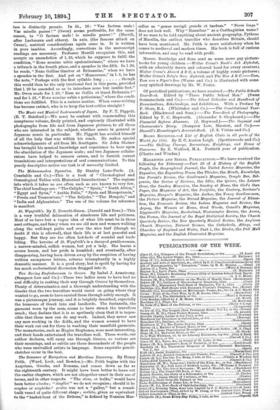The Romance of Navigation and Maritime Discovery. By Henry Frith.
(Ward, Lock, and Bowden.)—Mr. Frith begins with the Assyrians, Greeks, and Bomans, and comes down as far as the eighteenth century. It might have been better to leave out the earlier chapters, which are not altogether exact in their use of terms, and in other respects. "The oleos, or hulks," would have been better olcades ; " skaplioi" we do not recognise; should it be scaphae or scaphides ? gaulos was not a "galley," but a round- built vessel of grate different shape ; corbita, given as equivalent to the "basket-boat of the Britons," is defined by Nonnins Mar- cellus as "genus navigii grand° et tardum." "Naves longa " does not look well. Why" Hannibas " as a Carthaginian name ? If we were to be told anything about ancient geography, Pytheas of Massilia, the earliest traveller who describes Britain, should have been mentioned. Mr. Frith is more satisfactory when he comes to medireval and modern times. His book is full of curious information, and may be read with profit.






































 Previous page
Previous page